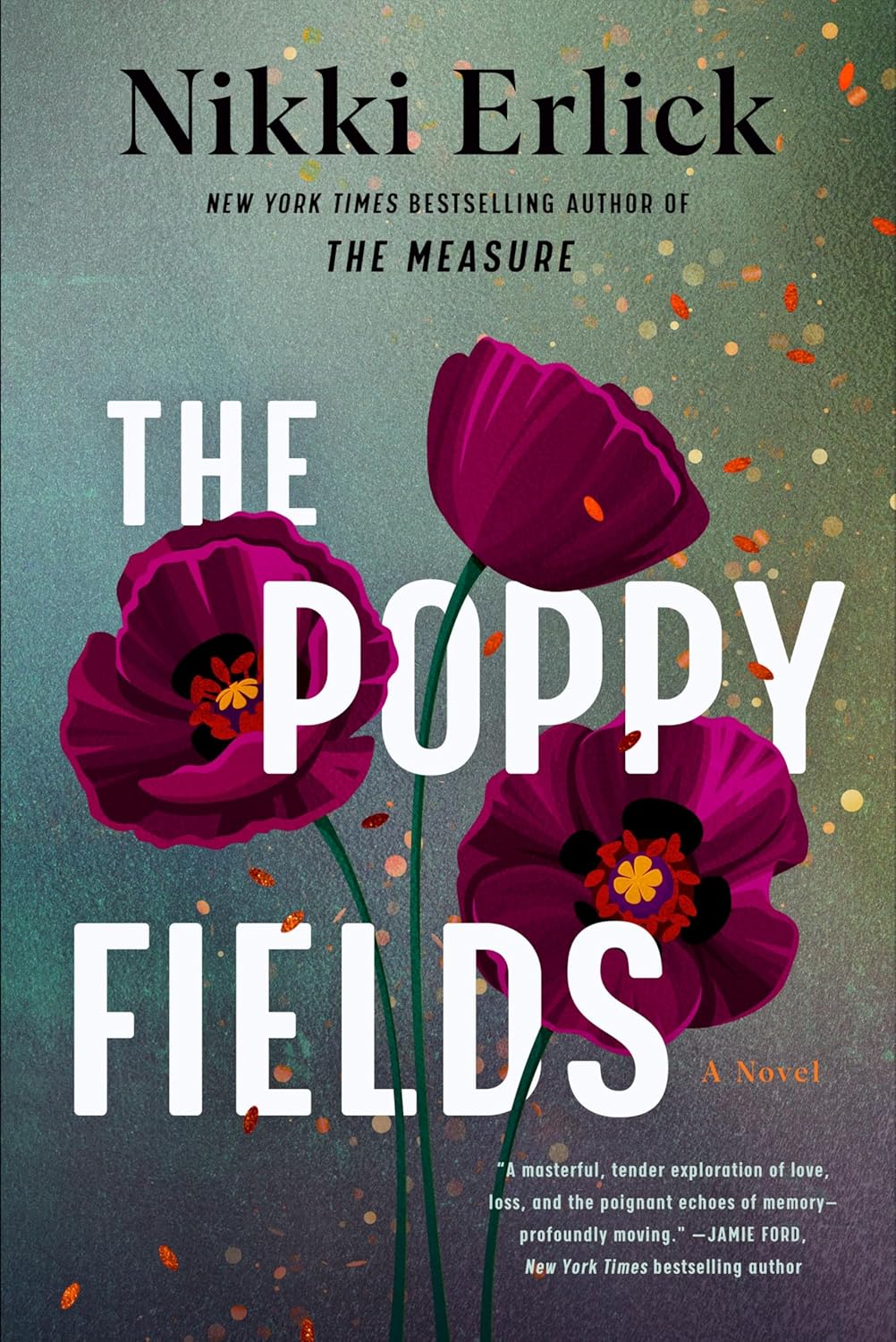In the vast landscape of contemporary literature, certain books emerge that don’t just tell a story but invite you into a profound conversation about the human condition. Nikki Erlick, celebrated for her thought-provoking debut The Measure, once again delivers a novel that resonates deeply, prompting introspection and challenging our perceptions of life’s most universal experiences. Her latest offering, The Poppy Fields, is a masterful exploration of grief, healing, and the controversial lengths humanity might go to escape pain. This isn’t just a story; it’s an immersive journey into the heart’s most vulnerable chambers, wrapped in a compelling speculative premise.
From the moment you pick up The Poppy Fields, you’re drawn into a world where the impossible seems tantalizingly within reach. Erlick has a unique talent for taking a “big idea” and grounding it in deeply human emotion, making the fantastical feel intimately real. This detailed The Poppy Fields book review will delve into the narrative’s intricate layers, dissect its memorable characters, explore its resonant themes, and analyze the author’s distinctive style, offering a comprehensive look at why this novel is a must-read for anyone seeking a story that truly lingers.
Unveiling the Tapestry: Plot and Premise of The Poppy Fields
Imagine a place where the crushing weight of grief could be lifted, where the agony of loss could be literally slept away. This is the audacious premise at the heart of The Poppy Fields. Nikki Erlick introduces us to a remote, experimental, and highly controversial treatment center nestled in the Californian desert, aptly named The Poppy Fields. Here, individuals suffering from profound heartache are offered a chance to enter a prolonged, medically induced slumber, hoping to emerge healed and unburdened by their pain.
The allure is undeniable: a shortcut through the agonizing stages of grief, a direct path to peace. However, as with any profound intervention, there’s a catch. A significant percentage of patients who undergo this “sleep therapy” experience a notorious side effect: while their acute pain dissipates, so too does their capacity to feel deep emotional attachment to their lost loved ones. They retain memories, but the love, the yearning, the very essence of their connection, is muted, perhaps even erased. This moral dilemma forms the compelling backbone of the narrative, forcing both characters and readers to confront the question: Is the absence of pain worth the potential loss of love?
A Glimpse into the Narrative Arc
The primary narrative thread of The Poppy Fields follows four disparate strangers whose paths converge on a cross-country journey from the Midwest to the enigmatic facility. Their flight to California is grounded by a natural disaster, forcing them into an unexpected road trip. Each carries their own unique burden of grief and their own motivations for seeking out The Poppy Fields.
- Ray, a firefighter, is driven by a desperate need for answers. His younger brother, Johnny, underwent treatment at The Poppy Fields and returned profoundly changed, leading Ray on a mission to understand what truly happened. His journey is one of guilt, brotherly love, and a search for truth.
- Ava, a children’s book illustrator, is on a quest to reconnect with her estranged sister, Ellis. Ellis, it turns out, is the brilliant, enigmatic, and fiercely dedicated founder of The Poppy Fields. Ava’s story explores the complexities of familial bonds, resentment, and the longing for reconciliation.
- Sasha, an occupational therapist, grapples with immense guilt over ending things with her fiancé just before his tragic death. Her pursuit of The Poppy Fields is a poignant exploration of regret, forgiveness (both for others and herself), and the elusive nature of peace.
- Sky, a free-spirited teenager, is picked up along the way, adding a layer of youthful curiosity and perspective to the group. Her presence often serves as a catalyst, prompting the others to open up and confront their reasons for embarking on this extraordinary journey.
- And, of course, there’s PJ, a friendly dog who accompanies them, providing moments of levity and unconditional companionship amidst the heavy emotional landscape.
As this unlikely quartet travels westward, their individual backstories are slowly revealed, weaving a rich tapestry of human experience. The road trip itself becomes a metaphor for their internal journeys, with each delay and detour forcing them to confront their pasts, challenge their assumptions, and forge unexpected bonds of friendship and understanding. The narrative also interweaves the perspective of Ellis, the founder, offering insights into her motivations, her own experiences with loss, and the ethical quandaries inherent in her groundbreaking work. This multi-perspective approach allows Erlick to explore the nuances of grief from various angles, making The Poppy Fields book review a truly multifaceted experience.
Characters That Breathe: The Heart of The Poppy Fields
One of Nikki Erlick’s undeniable strengths, evident in The Poppy Fields, is her ability to craft characters that feel remarkably real and relatable. They are not archetypes but complex individuals, flawed and vulnerable, each carrying a unique emotional burden that resonates with the universal experience of loss. Their journeys are deeply personal, yet their struggles and hopes are profoundly universal.
Protagonists and Their Journeys
The core of the novel rests on the shoulders of Ray, Ava, and Sasha, each representing a different facet of grief and the human desire for healing.
- Ray, the firefighter, embodies the raw, often volatile, nature of grief mixed with guilt and a thirst for justice. His brother’s transformation after the Poppy Fields treatment leaves him with more questions than answers, propelling him forward. Erlick meticulously portrays his internal conflict, making his struggle palpable. His journey is less about seeking treatment for himself and more about understanding the consequences of such a radical intervention on someone he loved.
- Ava, the illustrator, brings a quieter, more introspective form of pain. Her strained relationship with her sister, Ellis, the very architect of The Poppy Fields, adds a layer of familial complexity. Ava’s quest for reconciliation is intertwined with her own unaddressed grief, and her artistic sensibility often provides a unique lens through which to view the world and its sorrows. Her character highlights the often-unseen wounds within families and the courage it takes to confront them.
- Sasha, the occupational therapist, carries the heavy burden of regret. Her pre-wedding doubts, followed by her fiancé’s sudden death, leave her with a particularly agonizing form of grief – one steeped in “what ifs” and self-blame. Her story explores the insidious nature of guilt and the desperate search for absolution. Her professional background also offers a fascinating contrast to the experimental nature of The Poppy Fields, as she navigates the ethical implications of such a radical approach to mental health.
These three, along with the youthful and observant Sky, form an unlikely fellowship. Their interactions on the road are where much of the character development truly shines. They bicker, they confide, they challenge each other, and slowly, they begin to heal not just from their individual losses but from the isolation that often accompanies profound grief.
Supporting Cast and Their Impact
Beyond the central quartet, Nikki Erlick populates The Poppy Fields with a cast of supporting characters who enrich the narrative.
- Ellis Jones, the visionary founder of The Poppy Fields, is perhaps the most intriguing. Her ambition and unwavering belief in her work are balanced by her own personal history of loss, particularly her grandmother Mae. Her character raises critical questions about the line between innovation and intervention, and whether the pursuit of a cure can sometimes come at a human cost. Her journey is one of scientific dedication clashing with personal sacrifice, and the profound impact of her creation on countless lives.
- The various applicants and patients glimpsed through interview transcripts and brief vignettes add texture and universality to the themes. Their diverse reasons for seeking the treatment underscore the myriad ways grief manifests and the desperate lengths people will go to find solace. These brief glimpses serve as powerful reminders that while the main characters’ stories are specific, the underlying human experience of loss is shared by millions.
Erlick’s character work is consistently praised for its depth and relatability. She doesn’t shy away from their flaws or their pain, but she also highlights their resilience and their capacity for connection, even in the darkest of times. This makes The Poppy Fields book review not just an analysis of a plot, but an appreciation of a deeply human cast.
Echoes of Humanity: Themes Explored in The Poppy Fields
Nikki Erlick’s The Poppy Fields is a thematic powerhouse, delving into complex questions about existence, memory, and the very nature of healing. Like her previous work, The Measure, this novel uses a high-concept premise to explore deeply philosophical and emotional territory, making it a rich ground for discussion and reflection.
War, Memory, and Reconciliation (Figurative)
While not a literal war, the novel portrays the internal battle against grief as a profound conflict. The “war” is waged within the individual heart, against the overwhelming pain of loss. The experimental treatment at The Poppy Fields offers a kind of cease-fire, a surrender to a chemically induced peace. But this peace comes with the potential cost of memory’s emotional resonance.
The theme of memory is central. What does it mean to remember someone if the love you felt for them has been dulled? Is a memory without emotion still a true memory? Erlick challenges readers to consider the value of pain as an intrinsic part of love and memory. The characters grapple with whether true reconciliation with loss means forgetting the pain, or integrating it into a fuller understanding of life. This aspect of The Poppy Fields book review highlights the novel’s philosophical depth.
Love, Loss, and Resilience
At its core, The Poppy Fields is a profound meditation on love and loss. The characters’ motivations are rooted in their deep affections for those they’ve lost—be it a brother, a fiancé, or a grandmother. The novel beautifully illustrates the multifaceted nature of love: romantic, familial, and platonic. It shows how love can be a source of immense joy, but also the root of unimaginable pain when it is severed.
However, the novel is far from bleak. It is equally a testament to human resilience. Despite their profound suffering, the characters embark on a journey, seeking a way forward. Their ability to connect with each other, to share their vulnerabilities, and to find common ground in their shared humanity underscores the power of resilience. The road trip itself becomes a symbol of moving forward, even when the destination is uncertain. The novel suggests that while grief can bring us to our knees, the human spirit possesses an incredible capacity to adapt, to find new meaning, and to rebuild.
The Power of Connection
Perhaps the most uplifting theme in The Poppy Fields is the transformative power of human connection. The four strangers, initially bound only by their shared destination, gradually form a profound bond. Through their conversations, their shared meals, and their moments of vulnerability, they offer each other a different kind of healing—one born of empathy, understanding, and companionship.
In a world that offers a technological “cure” for grief, Erlick subtly argues for the enduring importance of human interaction. The shared journey, the listening ear, the unexpected laughter, and the simple act of being seen and understood by another person often prove to be as potent, if not more so, than any medical intervention. This highlights that true healing often comes not from avoiding pain, but from navigating it with the support of others. This element is crucial to any comprehensive The Poppy Fields book review.
The Art of Storytelling: Language and Narrative Style in The Poppy Fields
Nikki Erlick’s writing style is distinctive and contributes significantly to the immersive quality of The Poppy Fields. She possesses a remarkable ability to blend high-concept speculative elements with deeply emotional, character-driven storytelling.
Nikki Erlick’s Lyrical Prose
Erlick’s prose is often described as lyrical and evocative, yet accessible. She crafts sentences that are both beautiful and precise, conveying complex emotions and ideas without resorting to overly ornate language. Her descriptions are vivid, painting clear pictures of the Californian desert landscape and the internal worlds of her characters. She has a knack for poignant observations that resonate long after you’ve read them. While I don’t have direct quotes from the book, one can imagine passages that might explore the feeling of grief with a delicate touch, perhaps describing it as “a phantom limb, always present, even when unseen,” or the controversial treatment as “a quiet surrender to oblivion, promising peace at an unquantifiable cost.” Her writing often feels meditative, inviting the reader to pause and reflect alongside the characters.
Pacing and Perspective
The narrative structure of The Poppy Fields is multi-layered, enhancing its depth. The primary storyline follows the road trip of Ray, Ava, Sasha, and Sky, offering alternating viewpoints that allow readers to delve into each character’s internal world. This shifting perspective creates a rich tapestry of experiences, showcasing how different individuals grapple with similar universal challenges.
Interspersed with the road trip narrative are elements that build the world of The Poppy Fields and provide broader context. These include:
- Transcripts of applications and interviews from other prospective patients, revealing the diverse reasons people seek the treatment and the varying degrees of their suffering.
- News articles and reports about The Poppy Fields, highlighting the public’s perception, the ethical debates surrounding the facility, and the societal implications of such a radical approach to grief.
- Flashbacks that delve into the characters’ pasts, providing crucial context for their current motivations and the losses they carry.
While some reviewers have noted that the initial setup and extended backstories can make the pacing feel slow at times, particularly in the early chapters, this deliberate pace allows for a deeper immersion into the characters’ emotional landscapes. Once the narrative momentum builds, readers are often captivated, unwilling to put the book down. Erlick’s control over her characters and their intricate plotting, weaving in secrets and twists, keeps the reader engaged, making the journey as compelling as the destination. This thoughtful pacing is a key aspect of any thorough The Poppy Fields book review.
A Critic’s Eye: Strengths and Weaknesses of The Poppy Fields
No book is without its nuances, and The Poppy Fields is no exception. While overwhelmingly praised for its originality and emotional depth, a balanced The Poppy Fields book review must also consider its potential areas for reflection.
What Shines Brightly
- Original and Thought-Provoking Premise: The central concept of a facility where grief can be “slept away” is incredibly compelling. It immediately sparks ethical and philosophical questions about the nature of healing, the value of pain, and what it truly means to move on. This “big idea” is the book’s strongest hook.
- Deeply Human Characters: Erlick excels at creating relatable, flawed, and emotionally resonant characters. Readers will find themselves empathizing with Ray, Ava, and Sasha, recognizing aspects of their own struggles in the characters’ journeys. The development of their relationships on the road trip is particularly well-executed, showcasing the power of found family and shared vulnerability.
- Emotional Depth and Nuance: The novel tackles the heavy subject of grief with remarkable sensitivity and sophistication. It explores the myriad ways grief manifests—from raw anguish to quiet regret—and avoids simplistic answers. It acknowledges that healing is a complex, often non-linear process, and that there are no easy fixes for profound loss.
- Exploration of Universal Themes: Beyond grief, the book delves into themes of family dynamics, forgiveness, ambition, the ethics of scientific intervention, and the enduring importance of human connection. These layers add richness and make the novel resonate on multiple levels.
- Lyrical and Accessible Prose: Erlick’s writing is beautiful without being overly dense, making the complex themes digestible and the emotional journey impactful. Her ability to craft poignant observations is a highlight.
- Relevance: In a world increasingly seeking quick fixes for complex emotional problems, the novel’s exploration of “sleeping away” pain feels incredibly timely and relevant, prompting readers to consider the true costs of emotional bypass.
Areas for Reflection
- Pacing in the Early Chapters: Some readers might find the initial setup and the detailed backstories of the characters to be a bit slow. While this deliberate pacing allows for character development, it might test the patience of those who prefer a faster-moving plot from the outset.
- Ambition vs. Execution (Minor Threads): While the novel is ambitious in its thematic scope, a few minor plot threads or thematic explorations might feel slightly underdeveloped compared to the central focus on grief and the characters’ personal journeys. For example, some critiques mention the resolution regarding Ellis’s research into reversing the side effect feeling somewhat rushed, potentially undermining the tragic permanence of emotional moderation.
- Speculative Elements vs. Character Focus: While the speculative premise is strong, the novel leans heavily into character exploration and emotional depth rather than hard sci-fi explanations. Readers expecting a more detailed exploration of the scientific mechanics of The Poppy Fields might find that aspect less emphasized.
Despite these minor points for consideration, the overwhelming consensus is that The Poppy Fields is a powerful and rewarding read, showcasing Nikki Erlick’s continued growth as a masterful storyteller. This comprehensive The Poppy Fields book review aims to provide a balanced perspective for potential readers.
Voices from the Pages: Reader Impressions and The Poppy Fields Book Review Consensus
One of the best ways to gauge a book’s impact is through the voices of its readers. Impressions from platforms like Goodreads and Amazon frequently highlight the profound effect The Poppy Fields has had on its audience. The general consensus reinforces the idea that Nikki Erlick has once again delivered a novel that is both intellectually stimulating and deeply moving.
Many readers praise the book’s original concept, noting how it immediately hooks them and sparks internal debate. Phrases like “thought-provoking” and “compelling premise” appear frequently in reviews. The central question—would you choose to sleep through your grief, even with the risk of emotional moderation?—resonates deeply, prompting readers to consider their own answers.
The character development is another consistent highlight. Readers often express how relatable the characters are, finding themselves invested in Ray’s quest for truth, Ava’s journey of reconciliation, and Sasha’s battle with guilt. The dynamic between the four travelers on their road trip is frequently lauded as a source of warmth, humor, and profound connection amidst the heavier themes. Many reviewers feel that the characters “felt like family by the end,” underscoring Erlick’s ability to craft authentic human relationships.
The novel’s emotional depth is also a recurring theme in reader feedback. Reviewers often describe the book as “poignant,” “tender,” and “deeply moving,” appreciating how Erlick handles the complexities of grief with sensitivity and nuance. It’s noted that while the subject matter is heavy, the book is ultimately hopeful, focusing on resilience and the power of human connection. Readers who have experienced loss often find themselves reflected in the pages, gaining valuable insights into the healing process.
Some readers, similar to professional critics, mention the pacing as a minor point, particularly in the initial stages. However, this is often quickly overshadowed by their overall engagement once the story gains momentum. The speculative elements are generally well-received, with many appreciating that the focus remains on the human experience rather than getting bogged down in scientific details.
Overall, the The Poppy Fields book review landscape from readers paints a picture of a novel that is both intellectually stimulating and emotionally resonant. It’s a book that sparks conversations, encourages introspection, and ultimately leaves a lasting impression on those who embark on its journey.
Beyond the Pages: Personal Reflections on The Poppy Fields
As someone who deeply appreciates literature that challenges and moves, delving into the premise and critical reception of The Poppy Fields has been a truly compelling experience. While I haven’t physically turned its pages, the essence of Nikki Erlick’s storytelling shines through the collective insights gleaned from various sources. This is a book that, even from a distance, feels profoundly relevant to the human condition.
The central conceit of sleeping away grief immediately struck me. In our fast-paced world, where we often seek instant gratification and quick fixes for complex problems, the idea of a “cure” for heartache is both alluring and terrifying. It forces us to confront uncomfortable questions: Is pain a necessary component of growth? Can true healing occur without confronting the raw edges of sorrow? And what is the true cost of emotional bypass? Erlick, it seems, doesn’t offer easy answers, but rather invites us into a space of profound contemplation, which is precisely what I seek in a truly impactful novel.
What resonates most strongly with me is the emphasis on human connection as a counterpoint to the technological solution. The journey of Ray, Ava, Sasha, and Sky, forced together by circumstance, yet finding solace and strength in each other, speaks volumes. It’s a beautiful reminder that while individual grief is deeply personal, the path to healing is often illuminated by the empathy and understanding of others. In an age where isolation can be a silent epidemic, a story that champions the power of shared vulnerability and found family feels incredibly vital.
The exploration of memory and its emotional ties is another element that I find particularly fascinating. The idea that one might remember a loved one but no longer feel the pang of affection or sorrow raises profound questions about identity and the very fabric of our relationships. It makes me ponder whether our memories are truly ours if their emotional weight has been altered. This philosophical undercurrent elevates The Poppy Fields beyond a simple narrative, transforming it into a thought experiment that lingers long after the final page.
Nikki Erlick’s reputation for crafting “big idea” books that remain grounded in authentic human emotion is clearly evident here. Her ability to take a fantastical premise and make it feel intimately real, prompting readers to reflect on their own lives and relationships, is a testament to her skill. This is the kind of book that sparks lively book club discussions, encourages deep personal reflection, and might even shift one’s perspective on how we navigate loss in our own lives. For me, the power of a book lies not just in its story, but in the questions it leaves you asking, and The Poppy Fields seems poised to ask some of the most important ones.
Why The Poppy Fields Deserves a Spot on Your Bookshelf
In a literary landscape often saturated with fleeting trends, Nikki Erlick’s The Poppy Fields stands out as a novel of substance and enduring relevance. It is a testament to the author’s unique ability to weave high-concept speculative fiction with deeply personal and universal human experiences. This isn’t just another book; it’s an invitation to explore the most profound questions about grief, healing, memory, and the unbreakable bonds that tie us together.
From its audacious premise—a controversial treatment center where heartache can be slept away—to its meticulously crafted characters and their transformative road trip, The Poppy Fields offers a rich and rewarding reading experience. You’ll find yourself captivated by Ray’s quest for truth, empathizing with Sasha’s battle against regret, and rooting for Ava’s journey toward familial reconciliation. The unexpected companionship they find on their journey serves as a powerful reminder that sometimes, the most profound healing comes not from avoiding pain, but from sharing the burden with others.
Nikki Erlick’s lyrical prose and multi-layered narrative style ensure that the story is not only thought-provoking but also deeply engaging. She handles the heavy themes of loss and resilience with a delicate touch, making the emotional journey both impactful and ultimately hopeful. While it asks difficult questions, it also celebrates the enduring strength of the human spirit and the transformative power of connection.
If you’re searching for a book that will make you think, feel, and reflect long after you’ve turned the final page, then The Poppy Fields is an absolute must-read. It’s a book that will resonate with anyone who has experienced loss, questioned the nature of healing, or simply appreciates a story that delves into the depths of the human heart. Don’t miss the opportunity to embark on this poignant and powerful journey. Add The Poppy Fields to your reading list today, and discover for yourself why this novel is poised to become another beloved hit from Nikki Erlick.
Further Reading and Resources:
- You can learn more about Nikki Erlick and her other works on her official website: https://www.nikkierlick.com/
- Explore more reader reviews and add The Poppy Fields to your shelf on Goodreads: https://www.goodreads.com/book/show/218431658-the-poppy-fields
- For additional insights into the book’s themes and discussions, check out BookBrowse’s summary: https://www.bookbrowse.com/bb_briefs/detail/index.cfm/ezine_preview_number/20894/the-poppy-fields
“Enjoyed this review? Discover more in our Fiction Reviews section.”





